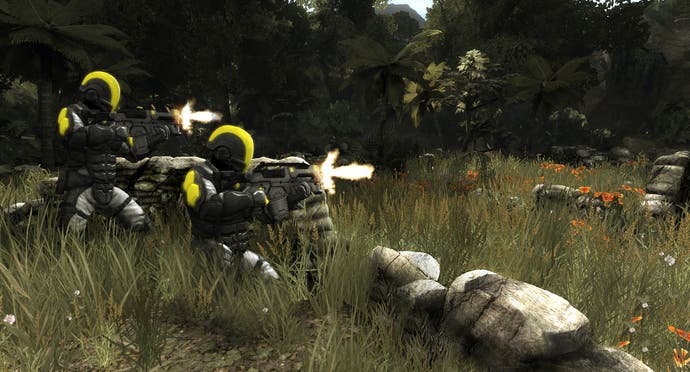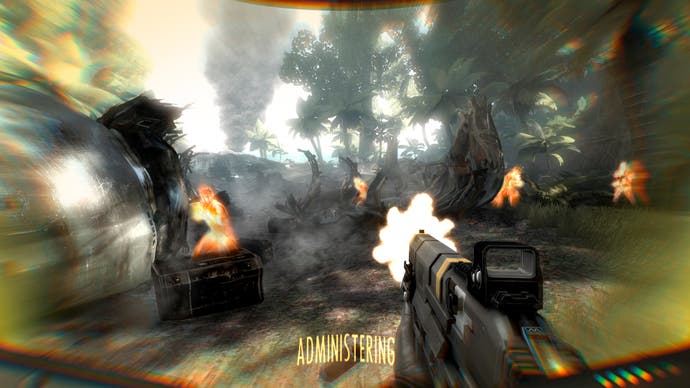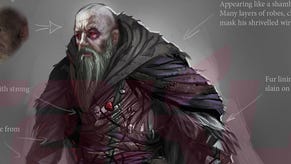Haze
Gunning for clarity.
We've overdosed on games before, but we don't usually overdose in games. And clearly for good reason: mainline a bit too much of Mantel Corporation's soldier-buffing war juice, Nectar, and you can't tell friend from foe, and everyone who crosses your sights eats lead whatever buttons you're pressing. Fortunately you go bright red, so people can pick you out. "Five seconds ago he was their best friend," says Free Radical Design's Rob Yescombe, chatting along to a four-man demo of upcoming FPS Haze during UbiDays. "But suddenly he's their worst enemy." There'll be tactical issues to consider in these situations: do you kill your squad-mate? Rob Yescombe looks like he'd kill his squad mate.
He's also the man who penned the script Haze is built around - "built around" being the operative phrase. Most games simply thrust you into scenarios; Haze wants to be about a story within that scenario. "All the other things are just like a bigger backdrop to it," head honcho David Doak will tell us later. So, first, the scenario. You are Shane Carpenter. You work for Mantel Corporation. "Mantel are a huge, multinational corporation with fingers in just about everything you can imagine - the rubber in your shoes, the ink in that pen, the gel in your hair. They're involved in it all," says Yescombe. "Of course they have their private military company that goes in because there's no more UN, no more NATO; these guys take care of business." As Carpenter, you're thrust into a three-day campaign in South America. So that's the set-up, but what's the story?
"Thematically Haze is very much related to propaganda and how we view the same event from different perspectives," Yescombe explains. "In war, there may be two sides, but there isn't one side going in thinking, 'we're the bad guys'. Everyone thinks they're the good guys." So it's about the ambiguity of your situation. "We're not doing a John Wayne war movie; we're trying to do Apocalypse Now. It's not a war-game; it's a game about war." Ambiguity indeed.

We ask Doak what sort of techniques FRD will use to elicit emotional reactions that go beyond the typical videogame range, as we've been told is their aim. "We do a lot of the kind of denial-and-confrontation thing where you see characters and you have a relationship with them and that relationship changes because they do unpredictable things, or they do things that make you feel uncomfortable about being associated with them," he explains. "It's a big challenge, and certainly more of a challenge than I thought it was going to be, doing those things in the context of a war-game. Because, you know, who's the murderer in the warzone? It's a hard thing to do, particularly in videogames where life is incredibly cheap. It's an interesting thing to try to actually address the emotions of being a soldier in an environment which is by its very nature sanitised. I think we're going to make some good steps in that direction, and I don't see anyone else trying to do it."
Other things they've done to keep you in the game include a Half-Life-esque determination not to exit the first-person perspective. "Every time you show them a loading screen or a menu, you're pulling them out of the experience and reminding them they're playing a game," designer Derek Littlewood points out. As it happens, there's another good reason that Haze wants to preserve its illusion: it has other ideas about how to use the principles of a videogame. We really get an appreciation of this when "Nectar goes wrong". That helmet you see in the shots - the all-over yellow bumblebee hockey affair - is not just protecting you from the elements, Gordon Freeman-style, but it's actually filtering the world to some extent. During one scene in the UbiDays trailer, Mantel bombs out a village, and when you arrive, the charred bodies quickly disappear. The following day in our gameplay session, the Nectar helmet malfunctions. All of sudden there's pain, and screaming, and suffering. "And the bodies don't fade away; they stay there," says Yescombe. In other words, the Diet Marine world of the Haze helmet is shielding you to Mantel's own operational advantage. The helmet comes back on. "Now you're back in the same videogame world where bodies fade away and there's no blood."

So we can expect Haze to look closely at the issues of morals, of how soldiers behave in warfare. This being Free Radical Design, though, we can also expect a rollicking good FPS to come out the other end, however weepy it leaves us. And there are some neat gameplay innovations flooding out of the Mantel silos too. Nectar's inherent usefulness to Mantel may seem to be laid bare (although we suspect there's more to it), and its inherent strength is the way it allows you to dish out and absorb more damage while in-use. But you can also derive various combat advantages from that handy backpack dispenser. "Perception" allows you to see enemies even through the dense jungle. "Foresight" gives you a "sixth sense" style warning pulse when a grenade's about to go off, or if somebody's about to melee-attack you from behind. "Focus" allows you to zero in on a target and dispatch them with a perfect shot, by tugging the auto-aim a little further into a target. There'll doubtless be other benefits, and over time Nectar regenerates. You can also "leech" it from your team-mates.



